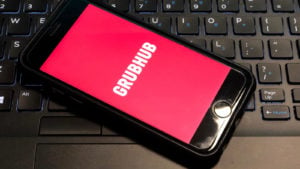Shares in Grubhub (NYSE:GRUB) rose recently on hopes the company will be bought. Then the company denied the report and the shares went back down.

Grubhub, a restaurant delivery service that went public in 2014, saw shares peak in 2018 at $146 each, but they opened Jan. 10 at $51.34 per share. The company has proven to be marginally profitable, with estimated 2019 sales of $1.3 billion. It has a market capitalization of $5.7 billion.
While Grubhub management now denies it is seeking a buyer, the question is who would buy it?
Some analysts mention Uber (NYSE:UBER) as a rational buyer. The ride-hailing company could expand its Uber Eats and give drivers work between rides. Others think Walmart (NYSE:WMT) or one of its grocery store peers could snap GRUB up. Grubhub owns a grocery delivery service called Seamless.
But even after leaking the news to The Wall Street Journal and seeing a 12% spike in the shares, no deal has emerged.
Low Profits, Slow Growth
Neither income nor growth investors have been happy with Grubhub. The Journal has been damning its business model for months. The business has matured, and it looks like an ugly duckling.
While Grubhub revenue has been growing at over 40% per year, expenses have been growing faster. Growth flatlined during 2019, and so did net income, as Grubhub faced increased competition from every direction.
Uber proved to be 2019’s big IPO disaster, and that failure is relevant here because the business model for Grubhub is similar. DoorDash is said to be unprofitable and considering a direct stock listing. Postmates has delayed its public offering. There’s also ChowNow, which focuses its pitch on restaurants rather than diners. Delivery.Com now offers services in 38 states. This is an industry that needs to consolidate to survive.
Alphabet (NASDAQ:GOOG, NASDAQ:GOOGL), has been arbitraging delivery services and integrating them into its search engine. Amazon (NASDAQ:AMZN) has been playing in the space through Deliveroo. Could these be the consolidators?
No Loyalty
On one hand, food delivery companies don’t create jobs, but “gigs” without benefits. Companies consider their drivers “tipped” workers, meaning they don’t have to pay minimum wage. Wall Street has concluded that sustainable companies offer real jobs.
Restaurants aren’t making much money either, and fast food operators are aligning themselves with a single delivery outfit, creating order flow but not profits.
Consumer loyalty has decreased. People choose whose food they want to eat, not their food delivery company. DoorDash seems to have passed Grubhub in market share.
Why a Grocer?
Grocers are seen by analysts as the natural buyers for food delivery companies because they would provide them an e-commerce solution.
But only Walmart would seem to have the cash available. Kroger (NYSE:KR), which has also been a rumored buyer, has committed to using Ocado, a British company, for fully-automated warehousing of deliverable groceries.
Consultant Brittain Ladd seems to be the source on the grocer rumors. He adds names like Albertsons and Ahold-Delhaize (OTCMKTS:ADRNY), owner of Hannaford and Stop & Shop, to the list. Ladd said he last spoke with Walmart executives in December.
The Bottom Line on GRUB Stock
I’ve used Grubhub a few times. I also began using DoorDash after my favorite barbecue joint chose it for exclusive delivery service.
The problem is that you’re paying a full restaurant price but getting none of the ambiance. You’re paying twice for your fast food meal, but chances are the fries have gone cold. Restaurants, meanwhile, are pressed to discount their prices by the delivery services.
No one is happy and no one knows where the industry might be going. Should restaurants set up separate kitchens for pick-up and delivery? Will the cloud companies simply scoop up the business?
It’s smart that Grubhub would seek a buyer. It’s not smart for any buyer to come forward.
Dana Blankenhorn is a financial and technology journalist. His latest book is Technology’s Big Bang: Yesterday, Today and Tomorrow with Moore’s Law, essays on technology available at the Amazon Kindle store. Write him at danablankenhorn@gmail.com or follow him on Twitter at @danablankenhorn. As of this writing he owned shares in AMZN.
